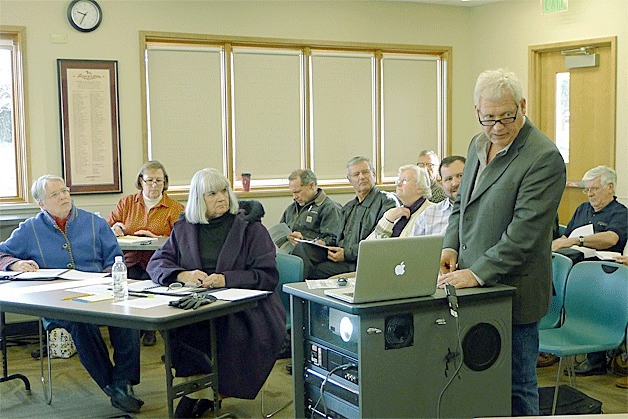A majority of volunteers examining the future of the Greenbank Farm voted this week that the Port of Coupeville should explore selling the publicly owned farm.
The Greenbank Farm Executive Planning Group released its report this week after spending six months researching the farm’s operations, interviewing leaders from the farm and Port of Coupeville and developing recommendations about how the farm should be operated after a current lease with the Greenbank Farm Management Group expires March 31, 2014.
The eight-member volunteer group, which was appointed by commissioners for the Port of Coupeville, voted 5 to 3 in favor of a proposal that the Port of Coupeville should pursue a conditional sale of the Greenbank Farm with restrictive covenants. The volunteer group consists of Rick Abraham, Janet Burchfield, Fran Einterz, Val Hillers, Gordon McMillan, Robert Pelant, Jim Phay and Kyle Waterman.
Abraham, chairman of the volunteer group, said the vote was expressing frustration over what members saw as a lack of financial oversight over the Greenbank Farm Management Group.
During a special Port of Coupeville meeting Wednesday morning where the recommendations were unveiled to the commissioners and public, Abraham said there has been a historic problem of transparency and oversight between the port and the management group.
“These issues continue to this day,” Abraham said, noting that public and private dollars were being “co-mingled.”
“There was no way to track how the money was being spent,” Abraham said during the meeting.
The Greenbank Farm comprises 47 percent of the Port of Coupeville’s expenses in recent years. From 2007 to 2011, the port’s expenses averaged about $208,000 a year.
Of that amount the port pays a $49,950 annual fee to the Greenbank Farm Management Group, according to the report.
In an interview after the meeting, Port of Coupeville executive director Jim Patton said he is bound by contract with the management group that was negotiated in 2004 before he was executive director.
“I think they failed to give due weight to the port’s limitation on the lease,” Patton said, noting that there isn’t any language in the lease about auditing the management group’s finances.
Financial concerns about the Greenbank Farm Management Group became public in October when then volunteer chairwoman Georgia Gardner resigned and noted several financial irregularities. Management group leaders said they’ve tried unsuccessfully to contact Gardner for elaboration.
Abraham took the port to task about the amount of time it took for the commissioners to take action investigating Gardner’s allegations.
“The port hasn’t made any individual effort on its own to see if there was any truth to her allegations,” Abraham said.
Port commissioners in December hired the port’s accountant, Chuck Edwards and Associates, to investigate Gardner’s allegations; however, his work was scheduled to be completes two days before the presentation.
As for selling the farm, that is an option that seems unlikely.
The port and Island County recently approved a conservation easement on the farm, which protects the agriculture, recreational and environmentally sensitive land at the farm.
In addition, the Port of Coupeville is paying a mortgage, which averages $104,000 a year, to the county to pay off bonds from 1997, Patton said. Because of the conditional sale contract, the port is prevented from taking any action that would affect the value of those bonds.



